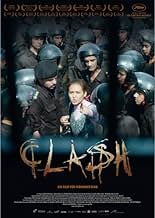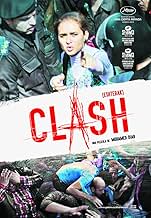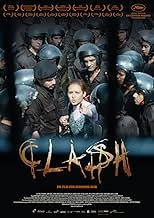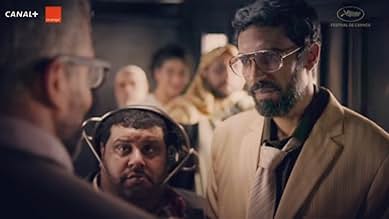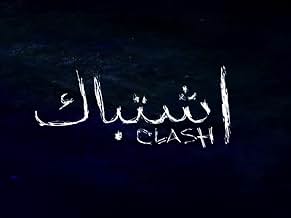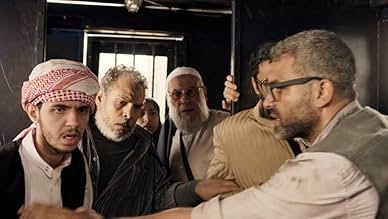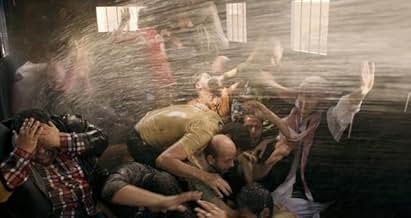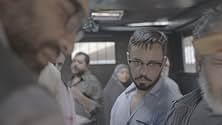IMDb RATING
7.4/10
6.5K
YOUR RATING
Set entirely in an 8m police truck, a number of detainees from different political and social backgrounds are brought together by fate, during the turmoil that followed the ousting of former... Read allSet entirely in an 8m police truck, a number of detainees from different political and social backgrounds are brought together by fate, during the turmoil that followed the ousting of former president Morsi from power.Set entirely in an 8m police truck, a number of detainees from different political and social backgrounds are brought together by fate, during the turmoil that followed the ousting of former president Morsi from power.
- Awards
- 13 wins & 9 nominations total
Muhammad El-Sebai
- Zain
- (as Mohamed El Sebaey)
Mohamed Elsewisy
- Uwais
- (as Mohamed El Souisy)
Ahmad Abdulhamid Hifni
- Awadh
- (as Ahmed Abdel Hamid)
Hosny Sheta
- Fishoo
- (as Husni Sheta)
Dash Ahmed
- Fares
- (as Ahmad Dash)
Gamil Barsoom
- Salah
- (as Gameel Barsoum)
Muhammad Tareq
- Hussein
- (as Mohamed Tarek)
Muhammad Gamal Qalbaz
- Tamer
- (as Mohamed Gamal Kalbaz)
- Director
- Writers
- All cast & crew
- Production, box office & more at IMDbPro
7.46.4K
1
2
3
4
5
6
7
8
9
10
Featured reviews
I appreciate a lot of what this attempts
I appreciate a lot of what this attempts, even if it doesn't always mesh together for a good film.
The acting is more than decent, the cinematography is impressive given the obvious limitations and the story it's attempting to share is compelling. However, I don't think there's enough there for a full-blown film. All the characters have their own story and motives which aren't overly developed, which generally leads to shouting matches every five minutes - which is simply irritating to watch.
I, admittedly, do not know anything close to enough about the Egyptian uprising of 2013, but every character says something or does something that I just find purely nonsensical; to the point where I'm not sure it would even happen in real life. Perhaps I'm wrong, certainly a possibility, though it just comes across that the filmmakers had loads of stories to tell and just crammed them in without making them appear logical.
I still find 'Clash' extremely interesting and admire how it's all filmed and put together, I just feel that the premise wears thin a tad.
The acting is more than decent, the cinematography is impressive given the obvious limitations and the story it's attempting to share is compelling. However, I don't think there's enough there for a full-blown film. All the characters have their own story and motives which aren't overly developed, which generally leads to shouting matches every five minutes - which is simply irritating to watch.
I, admittedly, do not know anything close to enough about the Egyptian uprising of 2013, but every character says something or does something that I just find purely nonsensical; to the point where I'm not sure it would even happen in real life. Perhaps I'm wrong, certainly a possibility, though it just comes across that the filmmakers had loads of stories to tell and just crammed them in without making them appear logical.
I still find 'Clash' extremely interesting and admire how it's all filmed and put together, I just feel that the premise wears thin a tad.
Claustrophobic Intensity
Some may argue that you cannot really 'get' this film unless you are knowledgeable about the geopolitics of Egypt. And they have a very valid point. However, this is far too narrow a view to have and fails to grasp the bigger picture at play here: the hatred and animosity of those who are blinded by their own political and religious views to the detriment of others. Or dismissive of those who are not part of either. And yet the director shows us glimpses of human understanding and compassion which breach through the hatred and contempt and gives the viewer hope. Even if short-lived.
It is very difficult to pull off a whole film in effectively one setting - the back of a police van, in this case - and hold the viewer's attention throughout. But this film succeeds with high marks on this count. And leaves the viewer questioning at the end: would we behave in a similar fashion to most of the characters or would we behave differently? Or is that all just wishful thinking?
An excellent, thought-provoking film. Highly recommend.
It is very difficult to pull off a whole film in effectively one setting - the back of a police van, in this case - and hold the viewer's attention throughout. But this film succeeds with high marks on this count. And leaves the viewer questioning at the end: would we behave in a similar fashion to most of the characters or would we behave differently? Or is that all just wishful thinking?
An excellent, thought-provoking film. Highly recommend.
Some 25 people cramped in police van. Insightful view on contemporary Egypt. Relief from serious undertone due to some humor and down-to-earth events, all inside same space
Seen at the Filmfest Ghent 2016 (website: http://www.filmfestival.be/en). Prior to the screening, the director told that he succeeded in pissing off everyone in Egypt by making this movie. Arousing that much controversy can be considered a huge success in itself, were it not that he suffered some trauma because of everyone punching him afterwards. Along the line, he was accused of being a spy, funded by the West, even though the film is against no one, just pro humanity in general. Even so remarkable is that the film got attacked by everyone equally, because it inadvertently seemed to humanize "the others".
After Lebanon (2009, Samuel Maoz) this movie extends the concept of the narrow space with a very limited view on the outside world, and no easy way to escape due to a hostile environment. New is that the 25 persons locked up in a police van, are very different from each other with respect to age, religion, politics, and even sexes are mixed with all complications thereof. In other words, the hostility is not only the outside world but comes from fellow prisoners too, maybe even more so from internal rather than external.
For me it was not easy to remember faces and names; I lost track of each one's political stance very soon. Nevertheless, the hodgepodge of people and attitudes is clear from the outset. There is spurious contact with other police vans, containing people in a similar position, with name exchanges to verify whether relatives or friends are kept there and hopefully are in good health. Also, there are frequent contacts with soldiers, sometimes helpful sometimes not so helpful due to orders from higher echelons, or flatly unhelpful because of uncertainty about the other side's intentions.
The Q&A with the director after the screening brought a lot of useful information, in fact an addendum to his initial address before the screening. I scribbled down the following notes. It is difficult to make a movie like this in contemporary Egypt. A self-contained movie could be made about the making of this one, or even around making movies in general in Egypt for that matter. And it can still be worse, when seeing the film being pulled off cinema listings after its official release. On the other hand, he received moral support from outside Egypt, like for example Tom Hanks, who wrote that this movie changed his view on Egypt. Following up on a question from the audience, about being still welcome in Egypt, the director replied that it is complicated. In any case, it is still unclear whether he could make any other film there. It is not that that some person or some bureaucracy is against, because of Egypt being so many things together and certainly no homogeneous mass. Another question from the audience about the humor that was prominently present, despite the subject matter being a very serious matter. The director replied that the humor was interwoven to breathe, something that is very common in Egypt, often observed even during funerals.
After Lebanon (2009, Samuel Maoz) this movie extends the concept of the narrow space with a very limited view on the outside world, and no easy way to escape due to a hostile environment. New is that the 25 persons locked up in a police van, are very different from each other with respect to age, religion, politics, and even sexes are mixed with all complications thereof. In other words, the hostility is not only the outside world but comes from fellow prisoners too, maybe even more so from internal rather than external.
For me it was not easy to remember faces and names; I lost track of each one's political stance very soon. Nevertheless, the hodgepodge of people and attitudes is clear from the outset. There is spurious contact with other police vans, containing people in a similar position, with name exchanges to verify whether relatives or friends are kept there and hopefully are in good health. Also, there are frequent contacts with soldiers, sometimes helpful sometimes not so helpful due to orders from higher echelons, or flatly unhelpful because of uncertainty about the other side's intentions.
The Q&A with the director after the screening brought a lot of useful information, in fact an addendum to his initial address before the screening. I scribbled down the following notes. It is difficult to make a movie like this in contemporary Egypt. A self-contained movie could be made about the making of this one, or even around making movies in general in Egypt for that matter. And it can still be worse, when seeing the film being pulled off cinema listings after its official release. On the other hand, he received moral support from outside Egypt, like for example Tom Hanks, who wrote that this movie changed his view on Egypt. Following up on a question from the audience, about being still welcome in Egypt, the director replied that it is complicated. In any case, it is still unclear whether he could make any other film there. It is not that that some person or some bureaucracy is against, because of Egypt being so many things together and certainly no homogeneous mass. Another question from the audience about the humor that was prominently present, despite the subject matter being a very serious matter. The director replied that the humor was interwoven to breathe, something that is very common in Egypt, often observed even during funerals.
An Extremely Realistic Film.
Describes the Arab Spring in Egypt. The film is shot in a single venue and tells the story of a day from the past civil war.A person who knows the geography of the Middle East and the history of Egypt will be different from those who do not know the messages they will receive from this film. People from the same root do not know what they get by breaking apart and killing each other. Are lessons learned from these and similar massacres? The answer to this question is very uncertain.
The movie has a clear message. Civil wars are unnecessary and people of the same nationality should not come to such games. One of the most powerful movies I've been watching lately. This film contains beautiful messages and is extremely realistic. You should give this movie a chance.
The movie has a clear message. Civil wars are unnecessary and people of the same nationality should not come to such games. One of the most powerful movies I've been watching lately. This film contains beautiful messages and is extremely realistic. You should give this movie a chance.
A pulsating thriller set within the confines of a police van traversing through Cairo during the riots
After almost three decades of dictatorial reign, when the government of President Hosni Mubarak was overthrown by the events following Tahrir Square in 2011, popular elections brought Mohammed Morsi of the Muslim Brotherhood to power in Egypt. However, his radical religious agenda drove a deep wedge in a multi-ethnic society and after a popular, violent uprising by his opponents in 2013, the army took control. This pushed the country on the brink of civil war. Egypt became a chaotic crucible and was enveloped in a season of daily protests on the streets between supporters of Muslim Brotherhood who felt that their democratically elected government was unfairly unseated and supporters of the army who sought an end to the fundamentalist regime of the Muslim Brotherhood.
The film captures one such day when protests break out in various parts of Cairo between these opposing factions. The entire movie is set and has been filmed within the confines of a police van which has been deployed on the street. While it starts with the arrest of an Egyptian born journalist working with the Associated Press covering the clashes along with his local freelance cameraman, the van is quickly filled up with a motley assembly of people cutting across the spectrum of age, economic status and owing their allegiance to either side of the ideological divide. Tempers fray with the supporters of Muslim Brotherhood and the pro-army group find themselves at each other's throats and find that their strength of ideological conviction is put to a litmus test by this sticky situation. As the cops try to shepherd the police van to safety traversing through treacherous streets of midtown Cairo filled with rioting mobs, the van - literally as well as figuratively - becomes a simmering cauldron ready to explode.
Read a full review @ - http://bit.ly/2jz1nUH
The film captures one such day when protests break out in various parts of Cairo between these opposing factions. The entire movie is set and has been filmed within the confines of a police van which has been deployed on the street. While it starts with the arrest of an Egyptian born journalist working with the Associated Press covering the clashes along with his local freelance cameraman, the van is quickly filled up with a motley assembly of people cutting across the spectrum of age, economic status and owing their allegiance to either side of the ideological divide. Tempers fray with the supporters of Muslim Brotherhood and the pro-army group find themselves at each other's throats and find that their strength of ideological conviction is put to a litmus test by this sticky situation. As the cops try to shepherd the police van to safety traversing through treacherous streets of midtown Cairo filled with rioting mobs, the van - literally as well as figuratively - becomes a simmering cauldron ready to explode.
Read a full review @ - http://bit.ly/2jz1nUH
Did you know
- TriviaDirector Mohamed Diab received a message from actor Tom Hanks thanking him for the movie. Hanks said that the film should change the way the West looks at democracy and politics in the Middle East.
- ConnectionsReferenced in Marvel Studios: Assembled: The Making of Moon Knight (2022)
- How long is Clash?Powered by Alexa
Details
Box office
- Gross US & Canada
- $18,215
- Gross worldwide
- $143,121
- Runtime
- 1h 37m(97 min)
- Color
- Aspect ratio
- 1.85 : 1
Contribute to this page
Suggest an edit or add missing content


